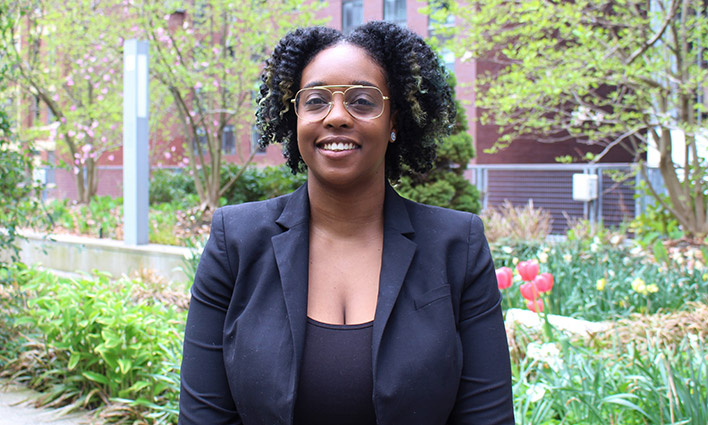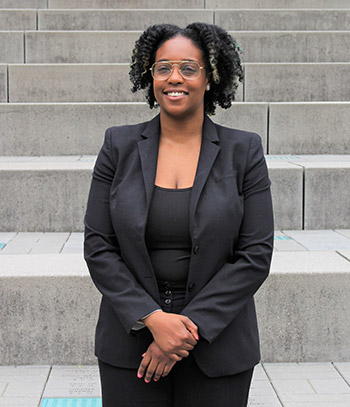
When Assistant Professor of Psychology, Veronica Johnson, Ph.D., learned she was named an awardee of the Penn Graduate School of Education 2019 ELEVATE (Enriching Learning, Enhancing Visibility & Training Educators) Fellowship, the first thing she thought of was the positive impact it would have on her students. “Like many of my students here at John Jay, I was a first-generation college student of color,” said Johnson. “As a professor working at a College with an incredibly diverse student population, it was vital for me to participate in a program like ELEVATE, that’s designed to provide professional development, mentorship, and networking opportunities to those faculty members working in Minority Serving Institutions.” She added, “It’s programs like ELEVATE and institutions like John Jay, that celebrate diversity, that enable professors to develop their skillsets, and by extension, allow us to better serve our minority students.” Through a three-day training program, ELEVATE supports the ongoing development of early-career faculty members at Minority Serving Institutions (MSI) via hands-on workshops that include grant writing, improving mentorship efforts, and learning how to maintain a good work/life balance. This gives the participant the skills they need to produce high-quality research and practice.
“It’s programs like ELEVATE and institutions like John Jay, that celebrate diversity, that enable professors to develop their skillsets and by extension, allow us to better serve our minority students.” —Veronica Johnson
Johnson, who earned a doctoral degree in Counseling Psychology from Columbia University, trained at two New York City hospitals—New York Presbyterian Hospital and Jacobi Medical Center—where she finessed her counseling psychology skills. After starting her own private practice, she found herself entering the academic world, pursuing her passion for education and research. She joined John Jay in 2017, and now teaches courses to both undergraduate and graduate students. “Every course I teach is different but they each offer me an opportunity to teach students about how the issues of race, gender, ethnicity, sexual orientation, and religion intersect with clinical diagnosis and treatment,” said Johnson. “These are the issues that I’m most passionate about and try to include in each course.”
We spoke with Professor Johnson to learn more about her research to enhance mental health treatment in communities of color and her goals for ensuring students’ success.
Can you fill us in on your research in enhancing mental health treatment?
My research has evolved somewhat over the past two years. I originally focused heavily on race-based traumatic stress—the traumatic reactions that can result from experiences of racism—and helped develop measures to assess how different types of racism, such as how avoidant racism, which can include excluding co-workers of color from work outings, impacts psychological health. Most recently, I have been examining how to incorporate more strengths-based approaches to therapy with clients of color. I developed a model of black cultural strengths for black American clients that essentially shows that culturally important values and practices such as spirituality and some types of racial socialization have a positive impact on black people’s psychological functioning. The goal is to promote these values and practices in therapy. I have also begun to explore how therapists’ behaviors, such as talking about white privilege, can impact clients’ of color feelings of safety and trust in therapy relationships.
You previously worked at New York Presbyterian Hospital and Jacobi Medical Center, and now have your own private practice in New York. What made you want to step into the world of teaching?
I was working at New York Presbyterian Hospital and Jacobi Medical Center during my graduate training years and while there I knew that I wanted to be a professor because I am very passionate about teaching and research, especially when it comes to issues of cultural diversity and clinical practice. I use many of my past clinical experiences, and current work in private practice, to inform how I instruct my students now. I have found that sharing my missteps and struggles as a clinician with my students, helps them to be less hard on themselves.
Was there a teacher that inspired you?
I have had some excellent teachers. One that stands out, is my fifth-grade math teacher, Ms. Neal. I was in the gifted program, and Ms. Neal was tough, requiring us to master material quickly. However, she always made herself available to us outside of school hours. She gave each student her home phone number and we were expected to call her when we got stuck on our homework. Because she made herself available to us, we never felt alone in our struggle to learn. I was grateful at the time, and often would call her in tears when I was frustrated and not understanding something. Looking back, I’m even more grateful now because she taught me how important it is to ask for help.

What do you teach at John Jay and what drew you to this subject?
I teach undergraduate courses on Abnormal Psychology and Clinical Instruction, and Introduction to Forensic Mental Health Counseling in the Master of Arts program. Each course is different but they offer me the opportunity to teach students about how issues of race, gender, ethnicity, sexual orientation, and religion, intersect with clinical diagnosis and treatment. These are issues that I am passionate about and try to infuse in each of my courses.
What have been some of your favorite and most challenging moments as a professor?
Some of my favorite moments have been when students stop by after they have taken class with me to have conversations regarding “professional development.” They want to know about jobs or graduate programs that they are applying to. It’s really rewarding to see students I have worked with move to the next stage of their lives. Honestly, the most challenging moments for me are when my teaching style and the learning style of a student do not match up. I like to think of myself as being able to be flexible in my style, but sometimes it’s just not a good match. I always think about what I can do better as an instructor and those moments stick with me. My goal is that my students leave the classroom wanting not just to be good at what they do, but wanting to be excellent at what they do.
“I hope that when my students see me standing in front of the classroom—whether it’s a class of 10 or 250 students—they recognize and know that they can be whatever they want to be.” — Veronica Johnson
John Jay is a College focused on justice, how do you teach your students about justice?
With my students, I often share how racism and sexism has impacted me in my own personal and professional life, so that they can recognize that systemic oppression impacts everyone, even their professor. I hope that each student I encounter has heard me talk about the ways—small, subtle, and very big ways—I fight for equity in professional and non-professional settings for myself and for others. I hope that they begin to challenge themselves to do the same. For me, teaching is one act of social justice that I engage in. I spent many years as an undergraduate and then doctoral student, and I cannot recall ever having a black, female professor. That is not to say that they did not exist, it just means I never had one. So being a professor was something I couldn’t really see myself being. I hope that when my students see me standing in front of the classroom—whether it’s a class of 10 or 250 students—they recognize and know that they can be whatever they want to be.



